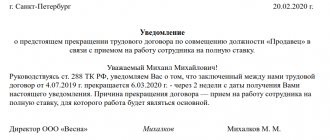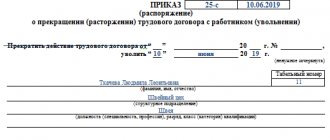In connection with current realities, the topic of violation of employee rights and illegal dismissals is increasingly being taken into account. It is worth first understanding the very concept of illegal dismissal.
Unlawful dismissal of an employee will be the termination of an employment contract by the employer without legal grounds. These types of dismissal include grounds that are not provided for by the Labor Code of the Russian Federation or based on false arguments of the employer, as well as dismissal with non-compliance with the procedure established by law.
You can legally terminate a contract on the following grounds:
- by agreement of the parties;
- upon expiration of the validity period (for concluded contracts for a certain period);
- at the employee’s own request;
- at the initiative of the employer;
- in connection with a transfer to another job;
- due to circumstances that do not depend on the will of the parties to the contract.
But the Labor Code of the Russian Federation does not have the concept of “illegal dismissal” as such, although it may exist if the court found the dismissal to have been committed in violation of legal norms.
How to understand that dismissal is illegal
- The employer dismissed the employee for violation of discipline without first imposing milder disciplinary sanctions, which could be a warning or reprimand.
- A dismissed employee is related to preferential categories of citizens. Such employees can be dismissed only on the basis of liquidation of the company or due to the expiration of a fixed-term employment contract with the absence of other vacancies for this citizen.
- The employer forced the employee to write a letter of resignation through deceptive methods or other measures when the employee did not have the desire to resign on his own.
- The reason for dismissal is not described in the Labor Code of the Russian Federation or other legislative acts;
- The employee was dismissed while he was on sick leave (however, such dismissal is legal during the liquidation of the company).
- The employer did not comply with the legal requirements for the dismissal procedure.
Dismissal under Art. 80 Labor Code of the Russian Federation
An employee can resign at any time of his own free will by notifying the employer at least two weeks in advance.
The warning period begins on the day following the date of submission of the application. You can terminate the contract without working out if the employer does not mind or there are good reasons:
- retirement;
- enrollment in an educational institution;
- relocation due to housing circumstances, treatment, etc.
The main condition is the voluntary submission of an application by the employee. In the book and order, the employer makes reference to clause 3, part 1. Art. 77 Labor Code of the Russian Federation.
What to do in case of illegal dismissal from work
The only possible solution to this situation is to go to court. The legislation provides specific periods from the date of illegal dismissal during which an employee can go to court.
This must be done in the first month from the moment of receiving a copy of the order or work record book or refusal to receive them. If you go to court after a month, the authority will refuse to consider the case. An exception in such situations may be cases of illness during this period of time.
You need to contact the district court. The employee is exempt from paying state duty. It is worth noting that neither the labor inspectorate (if you are not a member of a trade union) nor the prosecutor’s office will be able to consider the employee’s case. An administrative or criminal case can be initiated against an employer only on the basis of a court decision that has declared the company’s actions illegal.
Is it possible to fire without explanation?
The answer to this question is unequivocal - it is impossible. Even if the employer does not want to conduct a dialogue, he will still have to indicate the relevant article of the Labor Code as a basis for terminating the contract.
It will not be possible to dismiss without explanation and at the initiative of the employer. He will still have to collect all the documents and evidence of the employee’s guilty actions, request an explanation from him, and the latter will still find out about the reasons.
It happens that an employee is on vacation or on sick leave, but he is still fired under Art. 81 of the Labor Code of the Russian Federation, without observing the procedural order. This is illegal, the employer’s actions can be appealed in court and reinstatement.
If the court found the dismissal illegal
If the court recognizes the fact of illegal dismissal from work, the body may oblige the employer:
- Reinstate the employee in his original position.
- Pay the employee the average monthly salary for the entire period of forced absence due to illegal dismissal from the period of dismissal until the day of reinstatement or a court decision.
- Correct the entry in the work book to indicate “dismissal of one’s own free will” if the employee does not plan to continue working for this employer.
- Pay compensation for moral damage.
- Pay the employee court costs, as well as the costs of legal services of a representative in court.
The employee has the right to move and work at another job even while the case is being considered by the court. In this case, wages for forced absence due to illegal dismissal will still be recovered from the employer. That is, it is not at all necessary to be reinstated at your previous place of work. And an inappropriate entry in the work book can be legally replaced with “dismissal at will.”
Dismissal under Article 78 of the Labor Code of the Russian Federation
Art. 78 of the Labor Code of the Russian Federation allows you to terminate a contract by agreement. To do this, it is important to take into account several conditions:
- Mutual consent is required - signatures of both parties are placed on the document.
- The initiator of the agreement can be either the employee or the employer.
- In addition to basic payments, the agreement may provide for additional compensation. For example, “compensation” is a kind of payment for the employee’s consent to quit if the employer needs it in the first place.
- The agreement is concluded in writing, each person receives one copy.
In addition, in the agreement the parties themselves determine on what date to terminate the contract. The order and work book indicate clause 1, part 1 of Art. as the basis. 77 Labor Code of the Russian Federation.
What does an organization face for illegally dismissing an employee?
For illegal dismissal, administrative and, in some cases, criminal penalties may be applied to the employer.
- Administrative liability is expressed in the form of payment to the state of a fine in the amount of 1,000 to 5,000 rubles from the guilty official or a fine from a legal entity in the amount of 30,000 to 50,000 rubles, as well as a fine from an individual entrepreneur in the amount of 1,000 to 5,000 rubles. 5,000 rubles.
- Criminal liability occurs in cases of illegal dismissal of privileged categories of citizens, for example, single mothers who are raising a child under 3 years of age. In this case, Art. 145 of the Criminal Code of the Russian Federation and punishment in the form of a fine in the amount of up to 200,000 rubles, or in the amount of wages or other income of the convicted person for a period of up to 18 months, or by compulsory work for a period of up to three hundred and sixty hours.
The state labor inspectorate is responsible for bringing the employer to administrative liability, which must be contacted after the court makes a decision on actual illegal dismissal.
If you want to challenge illegal dismissal from work, then you first need to make sure that the employer violated the norms of the Labor Code of the Russian Federation, sue the employer with a subsequent ruling in your favor and initiate enforcement proceedings. If necessary, you can always get advice or legal assistance by contacting RosCo specialists.
Dismissal under Art. 81 Labor Code of the Russian Federation
If earlier in the Labor Code there were approximately seven grounds for dismissal under Article 81 of the Labor Code of the Russian Federation, now, after many amendments, there are 13 of them:
- Staff reduction.
- Liquidation of an organization, closure of an individual entrepreneur.
- Change of ownership of the enterprise property (general director, deputies, chief accountant are dismissed).
- Inconsistency with the position held (confirmation will require the conclusion of the certification commission).
- Loss of the employer's trust due to the guilty actions of an employee servicing material assets.
- Immoral behavior of an employee performing educational functions.
- For failure to fulfill official duties, if the employee has an outstanding disciplinary sanction.
- Falsification of documents when concluding an employment contract.
- A one-time gross violation of labor duties committed by the manager or his deputy.
- Making an unreasonable decision by a manager, deputy or chief accountant, if this resulted in loss or damage to company property.
- Failure to take measures to prevent conflicts of interest if this is part of the employee’s duties.
Let us dwell separately on clause 6, part 1, art. 81 of the Labor Code of the Russian Federation - one-time gross violations, after which they can also be fired. These include the employee’s state of intoxication at the workplace, disclosure of commercial or state secrets; failure to comply with labor safety requirements, if this resulted or could lead to adverse consequences; theft, embezzlement, embezzlement of enterprise property.
They can also be fired for absenteeism if an employee does not show up for work or is absent from the workplace without good reason for more than four hours in a row.
The legal algorithm of actions involves providing an explanatory note to the offenders. It must be submitted to the employer within two working days. Without clarifying the reasons for the misconduct, dismiss under Art. 81 of the Labor Code of the Russian Federation is impossible. If an employee refuses an explanation or ignores a requirement, a separate report is drawn up about this.
Dismiss under Art. 81 of the Labor Code of the Russian Federation is possible both during a probationary period or when working part-time, and in other situations. You cannot terminate the contract if the employee is on sick leave or on vacation: you need to wait for him to leave, and only then fire him.
Now let's look at several situations and the answers to them:
- If a statement is written at your own request and submitted to the manager, and the offense is committed later. The employer has the right to dismiss under Art. 81 Labor Code of the Russian Federation.
- The employee refuses to explain and does not sign the dismissal order. This does not prevent the termination of the contract, and a corresponding note of refusal is placed on the order.
- The employee has done something wrong and does not come to collect his dismissal documents. The employer must send him written notice of the need to appear for them in order to relieve himself of responsibility for late delivery.
If an employee has committed an offense and disappeared, you need to formalize everything correctly and immediately send him a notification by registered mail demanding that he pick up the documents. Otherwise, for failure to comply with deadlines, they may be charged under Art. 5.27 of the Code of Administrative Offenses of the Russian Federation, if the employee subsequently complains to the labor inspectorate or the prosecutor's office.
Who can't be fired
There are certain categories of citizens who cannot be dismissed under Article 81 of the Labor Code of the Russian Federation (Article 261 of the Labor Code of the Russian Federation):
- pregnant employees;
- a man or woman with a child under 3 years of age;
- single parent with a disabled child under 18 years of age or a child under 14 years of age;
- the sole breadwinner of a disabled minor child;
- the only breadwinner in a large family with a child under 3 years old.
Note: an exception is the liquidation of the company, systematic failure to fulfill official duties, a one-time gross violation, loss of trust or committing an immoral act: on such grounds the above persons can be dismissed.
Procedure
How to formalize dismissal at the initiative of the employer:
- Detection of misconduct, recording in documents.
- Providing an explanatory note.
- Issuing an order and familiarizing the employee with it against signature.
- Filling out and issuing a work book and other documents.
- Final settlement.
The procedure may vary slightly depending on the situation. For example, in case of drunkenness in the workplace, the employee must be asked to undergo a medical examination, and if he refuses, this must be reflected in the report.
What threatens
For an employee, the consequences of dismissal under Art. 81 of the Labor Code of the Russian Federation lies in possible difficulties in subsequent employment, because the work book indicates the specific basis on which the contract is terminated.
For the employer, negative consequences may occur if he did not comply with the procedural procedure for dismissal, did not complete all the documents, or terminated the contract illegally. In addition, criminal liability is provided for the unlawful dismissal of a pre-retirement employee under Art. 144.1 of the Criminal Code of the Russian Federation. In other cases, they may be subject to financial or administrative liability.
Content
- When dismissal is considered illegal
- Evidence of illegal dismissal of an employee
- Dismissal for absenteeism
- The employee was forced to write a letter of resignation
- Dismissal of an employee “for drunkenness”
- Dismissal during illness or vacation
- Time limits for appealing illegal dismissal
- Procedure for a dismissed employee
- Documents for a claim to challenge dismissal
- Reinstatement of an illegally dismissed employee
- Worker's compensation
- How can we help?
For non-compliance
Clause 3 of Part 1 of Article 81 of the Labor Code of the Russian Federation provides that an employee can be forgiven if it is revealed that he is not suitable for the position he occupies.
However, everything is not so simple here. The resolution of the Plenum of the Supreme Court of the Russian Federation dated March 17, 2004 No. 2 states that dismissal for such a reason is permissible provided that the employee’s inadequacy for his position or work performed due to his insufficient qualifications is confirmed by certification results. That is, the subjective opinion of management that the employee does not correspond to the position, or simply cannot cope with the job, is not enough. Therefore, the employer does not have the right to terminate the employment contract with a specialist on the above grounds if the employee’s knowledge has not been tested, or the certification commission has come to the conclusion that the specialist is professionally suited. The Plenum of the Supreme Court also clarified that the conclusions of the certification commission about the employee’s business qualities are subject to assessment in conjunction with other evidence in the case. This means that if, in the process of parting with an employee, a dispute arises that reaches the arbitrators, then the servants of Themis, although they will take into account the opinion of the commission, but it will not be decisive; judges will also take into account, for example, the opinion of the head of the company about how suitable the employee is for the position held. Please note: it is allowed to fire a person for his professional incompetence only if it is impossible to transfer the employee to another job, for example, a vacant position.
Please note: it is permitted to fire a person for unsuitability only if it is impossible to transfer the employee to another job, for example, a vacant position that matches the employee’s qualifications or to an open lower-level vacancy/lower-paid job. At the same time, part 3 of Article 81 of the Labor Code of the Russian Federation obliges the company to offer the employee all positions that meet the above requirements.
Let us once again return to Resolution No. 2 of the Plenum of the Supreme Court of the Russian Federation. Now let us study the following important clarification contained in the paper. If an employee was dismissed under paragraph 3 of part one of Article 81 of the Labor Code, then the company is obliged to provide evidence indicating that the employee refused the transfer, or the company did not have the opportunity (for example, due to the lack of vacancies) to “transfer” the person with his consent to another position.
Rostrud, in Letter No. 1028-s dated April 30, 2008, clarified that dismissal on the above grounds without certification is not provided.
Thus, saying goodbye to an employee for his inadequacy for the position is quite problematic.
What to do in case of threats
Often an employee quits voluntarily so as not to worsen his situation. But the manager can threaten the person, demand compensation, etc. What to do in this case? There are several options:
- First , try to reach an agreement peacefully. For example, compensation for damage and resigning without a clause.
- Secondly , record the conversation. It can be used as evidence of violation of labor rights in court.
- Third, obtain testimony from witnesses.
- Fourth, write a statement, but do not indicate the date. Send a notice of refusal of reduction by mail the next day. The employer will not be able to refuse and will legally cancel the dismissal order. True, this will not improve the relationship between employee and manager.
Otherwise, you can contact the Labor Inspectorate . Be sure to attach evidence to the application or a link to it. The verification lasts up to 30 days . If a violation on the part of the employer is recorded, the application is submitted to the prosecutor's office.
Procedure for a dismissed employee
When challenging illegal dismissal, the victim must follow a certain procedure:
- The plaintiff collects the necessary evidence and draws up a statement of claim to the court for illegal dismissal. A copy of the claim is sent to the defendant; starting from 2021, this is a mandatory procedure.
- The statement of claim and the documents attached to it are submitted to the court. The judge, within five days, makes a decision on accepting the claim for consideration or refusing to consider it.
- A date is set for a preliminary court hearing, at which the court clarifies the plaintiff’s claims and other circumstances of the case. There are many court cases where already at this stage the parties signed a settlement agreement and court hearings were terminated.
- The court schedules a hearing on the case (can be held on the same day as the preliminary hearing). The parties to the trial present their arguments and evidence to the court. The court makes a decision on the claim.
- If none of the parties challenges the court decision within a month, it enters into legal force.
As you can see, the procedure for challenging illegal dismissal is quite complicated. It is usually impossible to do without the help of an experienced lawyer. In addition, courts often return claims or refuse to accept them for formal reasons.
When preparing a statement of claim, special attention must be paid to determining the subject and object of the claim, as well as correctly determining the subject of proof. If you make mistakes at the initial stage, you will not be able to correct them later.
Our specialists have extensive experience in resolving labor disputes in court and will provide you with all the necessary legal services: from initial consultation and drawing up a statement of claim to full legal support.
Important!
The cost of our services directly depends on the result we achieve. We often work without advance payment. Payment for services is made only after achieving a positive result in court.
Documents for a claim to challenge dismissal
The statement of claim for unlawful dismissal must be accompanied by:
- evidence in the case: certificates, explanatory notes, other written or other evidence;
- a copy of the employment contract;
- a copy of the work book;
- dismissal order (if the plaintiff received this document);
- notification that the defendant has received a copy of the statement of claim.
Theft and embezzlement
Grounds - clause 6 of Art. 81 of the Labor Code of the Russian Federation: “Commitment at the place of work of theft (including small) of someone else’s property, embezzlement, intentional destruction or damage, established by a court verdict that has entered into legal force or a resolution of a judge, body, official authorized to consider cases of administrative offenses” .
How does dismissal occur on such grounds? It is already clear from the text of the law that this requires a court decision or a resolution of an authorized official. That is, an investigation needs to be carried out. In practice, the employee is offered to leave of his own free will, so as not to make a fuss, which under various circumstances affects the reputation of both the employee (even if he is not guilty of anything) and the organization. The choice is up to the citizen: for him, the question of what will happen if he is fired under an article for theft is acute, since when looking for a new job, the fired person will not be able to apply for positions with financial responsibility.
conclusions
Most company managers tend to believe that it makes no practical sense to fire an employee on their own initiative. Yes, this solves the problem, and the company stops seeing the boring face in the workplace. But there is also the so-called “own desire”, which, in most cases, is offered to subordinates. Fortunately, if the director proposes to resign, then in the future it will be more correct to make an entry “by agreement of the parties.” It implies certain financial compensation for the subordinate and therefore companies do not favor it. If in this case the employee begins to “download his rights,” then this may anger the director, and he will offer to “quit as expected.” In any case, we recommend standing up for your rights and proceeding from a sense of fairness in making decisions.
Thank you for your attention and see you again!
The article is not as scary as it is made out to be...
“Dismissed under article...” - this terrible phrase for an employee came to us from the Soviet era. For that time, it may have been terrifying, but not now, when the question of abolishing work books and drawing up employment contracts generally arises.
Another nuance is that the organizations in which people had to work were, for the most part, state-owned, and the application of strict labor code standards was, although not very common, a rarity. And the laws were really followed back then.
So, in order to apply such a norm (according to the Labor Code at that time), it was necessary to justify the decision and agree on it with the staff and the trade union. Today everything is simpler and easier, there is no need to convene party and trade union meetings, and the decision is made individually by the leader on the basis of reports submitted to him.
For these reasons, when rehiring, another employer is skeptical about such a record. Exceptions are cases when it comes to appearing at work while drunk or for violating safety regulations.
Thus, a lot depends on the wording of the article.
How can we help?
Labor disputes over illegal dismissal seem simple only at first glance. In fact, the plaintiff in court most often finds himself face to face with the employer’s experienced lawyer. In such a situation, it is unreasonable to rely only on one’s own strengths, counting on the fact that the employer does not have insurance. Typically, HR employees, with the help of a company lawyer, draw up all dismissal documents in such a way that challenging them becomes a difficult task.
If you are challenging illegal dismissal, a lawyer specializing in labor law will provide invaluable assistance. Legal specialists provide services to protect clients from illegal dismissals. Our employees:
- will carefully analyze your situation;
- based on this analysis, they will advise you on the prospects for the development of your dismissal situation;
- will try to solve the problem pre-trial by filing a complaint for illegal dismissal;
- if a pre-trial solution to the problem is impossible, a claim for illegal dismissal will be filed;
- will represent your interests in court in a claim challenging illegal dismissal.
In addition to providing individual services, we can enter into an agreement with the client to manage your case on a turnkey basis, that is, until the process of your reinstatement at work is fully completed and you receive the moral compensation due in case of illegal dismissal.
So, we have looked at how a citizen who was fired illegally can restore his rights. Of course, in each individual situation, the recovery procedure may differ significantly from that described above, which is why it is advisable to involve an experienced lawyer in solving the problem. Considering the shortened statute of limitations, we recommend not delaying the start of the process of declaring the dismissal illegal.
We also draw your attention to the fact that our law firm, along with providing services in labor disputes, specializes in [anchor href=»h-cons.ru/neustojka/10-sovetov-vzyskaniya-neustojki-po-ddu»] collection of penalties under the DDU, rental disputes, as well as in other areas of civil law. You can get more detailed advice, taking into account the specifics of your situation. Leave a request on the website, or call us!
On the issue of consequences
The most logical consequence is that subsequent employers may refuse to hire you. But, in the conditions of the modern labor market and the shortage of workers, as well as qualified specialists, this happens infrequently. Additionally, just like employees, HR departments look at competitor reviews online.
The reason is that a competitor who regularly changes staff is, in fact, not a competitor. And a lot of negative reviews about the company as an employer are not particularly beneficial for her.
The most difficult issue to resolve is for those who have at least two such records in their employment records. In these cases, employers often make a decision not in favor of the applicant, because it is easier to refuse to hire than to fire.
Is it possible not to pay wages?
It is also impossible to fire an employee without payment of wages. Even if he has seriously committed a crime or simply has a bad relationship with him, wages and compensation for unused vacation days must be transferred on the last working day (Article 140 of the Labor Code of the Russian Federation).
Sometimes deductions from wages are still possible (Article 137 of the Labor Code of the Russian Federation). For example, if an employee quits without paying off the advance; for unworked vacation days provided in advance; when returning overpaid amounts due to accounting errors. The amount of deductions cannot exceed 20%, in some cases – 50% (Article 138 of the Labor Code of the Russian Federation).
Adviсe
Here are some tips on how to avoid being fired due to an unpleasant article:
- Once you find yourself in disgrace, document every step and decision.
- Do not be subject to disciplinary action. One lateness is an accident, two latenesses are a system.
- Absenteeism without good reason is grounds for dismissal.
- Read the employment contract.
- Study job descriptions.
- Stand up for your rights.
- Do not believe that there is some kind of database of those fired under the article, which employers will use when making a decision about your employment: there is none, there is no need to be afraid of it.






